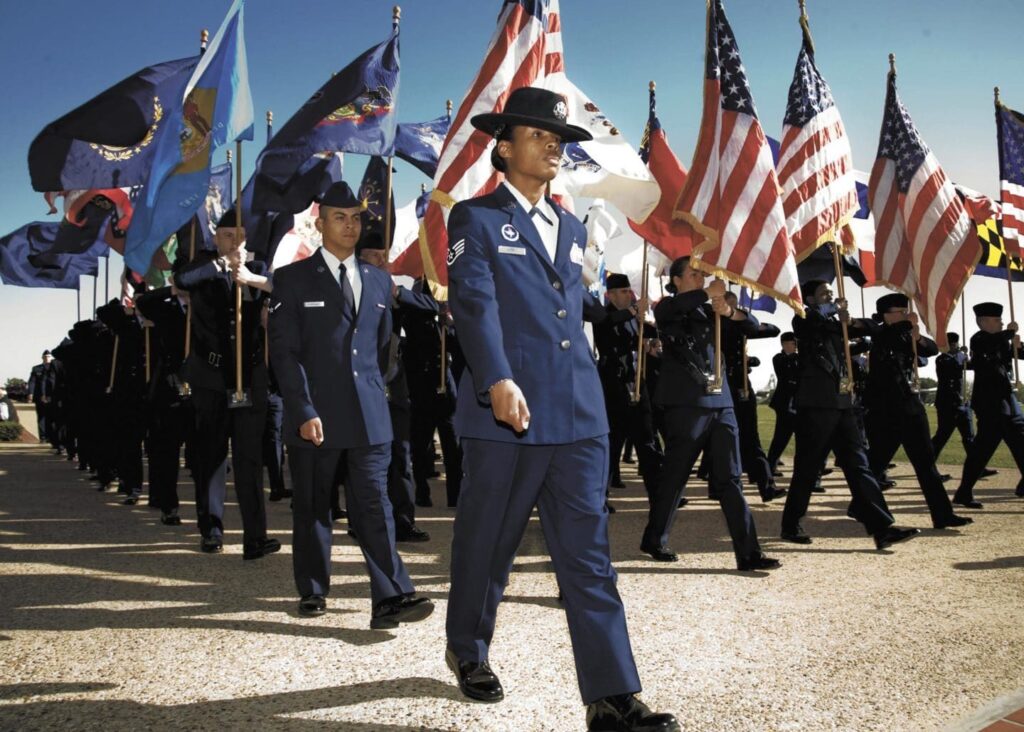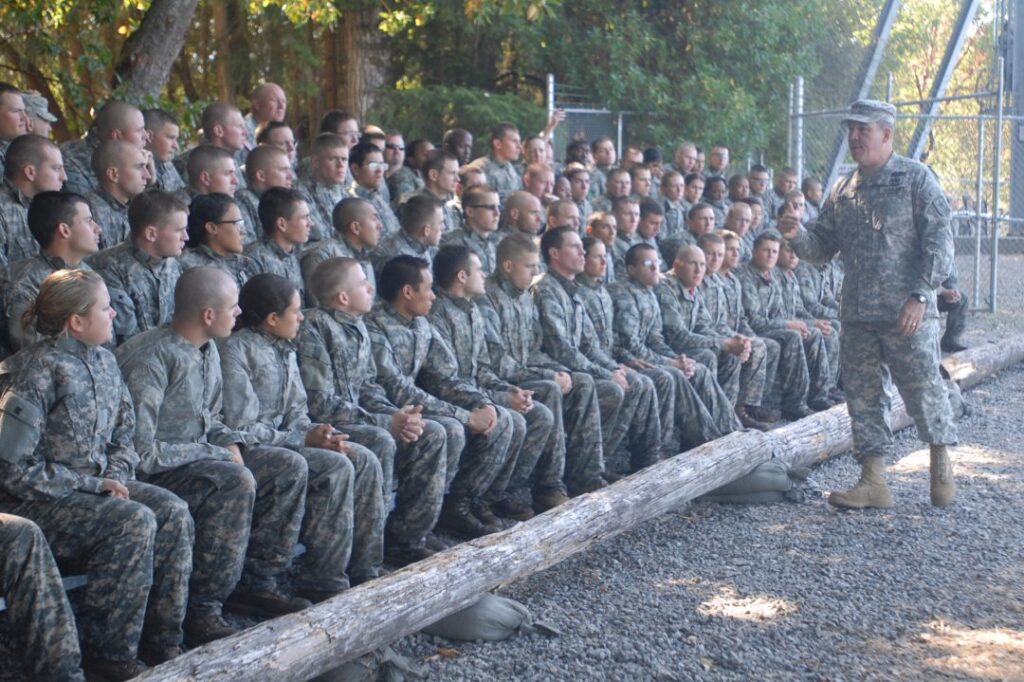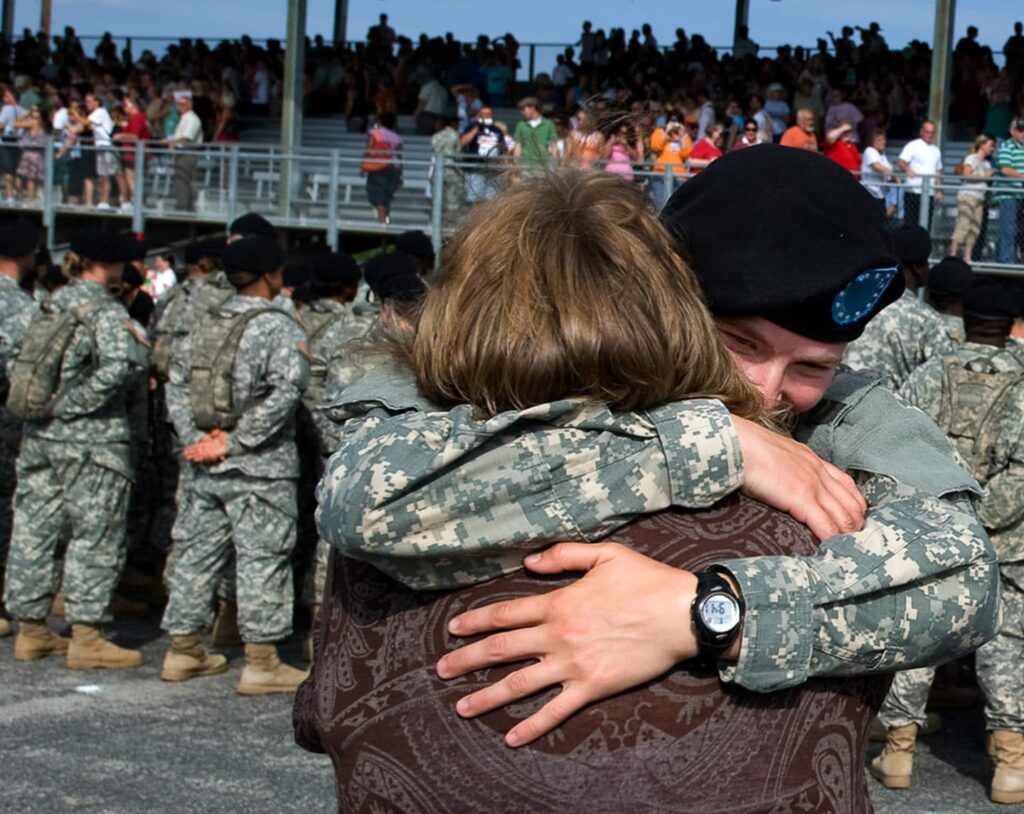
- The App
- Sandboxx News
- Resources
Learn
- Company
About
Become a Partner
Support
- The App
- Sandboxx News
- Resources
Learn
- Company
About
Become a Partner
Support
Being in a military relationship can, at times, be difficult. There seem to be so many “rules”, expectations, and a lot of unknowns when it...

Being in a military relationship can, at times, be difficult. There seem to be so many “rules”, expectations, and a lot of unknowns when it comes to living on a military base. Whether you’re dating someone who is about to go through basic training, or are in a relationship with a service member already in active duty, we’ve put together a list of 5 of the most essential “need to know” rules for life on a military base.
Being in a relationship with a service member is going to involve a lot of different social activities, from unit picnics to formal military balls. Here are a few tips for “dressing the part” so that your attire doesn’t reflect poorly on your service member.
For family oriented events, like unit family picnics and family fun days, dressing modestly is the most appropriate approach. Avoid “booty shorts”, teeny bikinis or other overly reveling outfits.
For male spouses, avoid too tight or too short shorts, low rider pants and similar types of clothing. You’re bound to see someone at these types of events dressed inappropriately, and you’ll also hear everyone talking about that person AND their service member, it most likely won’t be in a good way.
For more formal events such as holiday parties, military balls and dining out (a term used for unit events that require dressing up), there are a few additional “rules.”
First, the modest attire we talked about above goes for these events as well. This is not to say you can’t wear a dress that hugs your curves, but any fancy dress attire should be tasteful. For male spouses, think a nice suit and tie or tuxedo (if the ball is a black tie event).
Avoid drinking too much at these events. Getting tipsy or overly drunk at a military event is not the best reflection on your spouse. While the service members might be drinking grog and probably acting up a bit, spouses should keep this type of behavior to a minimum.
You may notice these events relax a bit after the command leaves. You can also loosen up a bit then, but remember that people talk, and the military is like a small town where everyone knows everything about everyone – you don’t want to be the talk of the town.
If you are at private, non-unit or
We know it seems like the spouses are almost held to a higher standard than their military member. In a
Driving on a military base is much like driving anywhere else, but are a few instances you will want to take more precaution. In the civilian world, most people manage to get away with going a bit over the speed limit, or maybe pausing more than stopping at a stop sign. They might even fail to use their turn signal once in awhile.
On a military base, these things can’t happen. You might think going 38 mph in a 35 mph zone is not a big deal. While this is true off base, on base it’s a lot stricter. 35 means 35 or even a little less.
Coming to a full and complete stop at stop signs and knowing the four-way stop procedures are all important, too. As is using your turn signal to turn, even when you’re in a turn lane. Not wearing your seat belt can also get you a larger fine than would be off base.
Finally, all United States military bases are “
Keep in mind, speed limits that are much lower to what you are used to seeing. For example, housing areas are usually 15 MPH or less. If you find yourself coming up on and passing a formation of Soldiers/Marines/Sailors, the speed limit is 10 MPH regardless of what the posted speed limit might be.
Keep in mind, if you get pulled over and get a ticket, your service member’s command will be notified that their spouse got a ticket. And they can be held accountable for your mistake. So drive safe and remember that while driving on base isn’t much different than driving off base, the rules and laws are more strictly enforced.
This seems like a no brainer, but we’ve seen many service members’ significant others talking, texting, chewing gum, or even smoking while the National Anthem is playing.
Regardless of your political views, you should always display respect for the National Anthem while it is played. This means standing quietly with your right hand over your heart. Your service member will likely be standing at attention and saluting, so, if not for yourself, make the effort to be respectful for your service member. Your behavior reflects on him or her.
We get it. A person in uniform can be extremely attractive, and it’s tempting to want to share some affection with them while in uniform. However, doing so in public is not a good idea. While your service member is in uniform, he or she is expected to behave and present themself in a certain way.
What does this mean for you? You shouldn’t be hanging all over your significant other in public. This doesn’t mean you can’t have any physical contact. Hand holding may be acceptable, but the best route to take if you MUST have physical contact is to put your right hand through his left elbow (this rule doesn’t apply if you’re the guy and your service member is the gal).
Also, it’s important to remember to walk on their left side so that they can salute when necessary. Keep your kisses conservative, a quick peck at best…and save the more intimate kisses for when you’re in private.
Keep in mind, though, the PDAs rules do NOT apply when your service member is returning home from deployment. When you meet them at the airport (or wherever they are being released) it is more than acceptable to hug, kiss and generally show lots of love!
You may find yourself walking and talking with your service member, when all of the sudden, you realize that they have stopped walking with you and are standing at attention facing the flag or the sound of the bugle if no flag is visible. You might ask them what they are doing, and they really won’t be able to respond, so here’s your insider tip:
When on base and in uniform, all service members are required to stop what they are doing when they hear the playing of colors, turn to face the flag (or the direction where the flag is if it isn’t visible) and stand at attention.
On some military bases, whether in or out of uniform, this is required at raising/retiring the flag. Similarly, if you’re on base and are in the car, your service member will pull over, exit the vehicle and stand at attention (if out of uniform) and salute (if in uniform) until the bugle stops playing. Some service members take this so seriously that, whether in or out of uniform, if they are in ear shot of the bugle, they will stop and stand at attention.
Keep in mind, your service member is following the rules when they do this and although you are not required to stand at attention or salute the flag, you should be respectful and stop talking and walking, and turn your attention to the flag. If you are so inclined, you can put your right hand over your heart as you would during the national anthem.
All of these courtesies are normal for military members and you will get used to it to the point where they are second nature for you, too.
We all love wearing a significant other’s big comfy sweatshirt, t-shirt or sweatpants. In the military, service members will acquire a lot of physical training gear, fleecy coats and other comfy pieces that will be very tempting for you to wear. Heed our advice: don’t.
There are a ton of posts on social media showing significant others wearing their spouses’s gear or uniform, and you don’t want to be one of them! It is seen as highly disrespectful and frowned upon in the military.
Keep in mind your service member worked very hard to earn the privilege of wearing the uniform (whether its PT gear or the a simple windbreaker jacket) and as a spouse, you did not. Respect them, their service, and their efforts by keeping their military clothing on their side of the closet.
If you really want to show off your service members branch, rank or last name on some cute clothing, look on sites like Etsy to find personalized clothing options and accessories. For example, wearing “Love My Soldier/Marine/Sailor/Airman, etc.” type pieces is just as gratifying and looks cuter anyway!
When you move to a new base, you’re bound to find a Facebook group that is filled with other significant others on base as well. It’s great to have a good support system while in the military, because when your significant other is deployed or on long trainings, this group of people may just become your shoulder to lean on or saving grace.
With that being said, make sure you don’t post about any personal matters between you and your significant other on social media, or discuss them publicly. Not only does it reflect poorly on your service member, but what happens in your relationship should really stay between the two of you. Don’t get others involved; it will just get messy. Be careful who you share personal information with as well. You don’t want that one bad apple spreading rumors or misconstruing what you say in social conversations.
To conclude, the best part about being in a military relationship, aside from being with the person whom you love, is that there are a lot of other people in the community who are going through exactly what you’re going through. There will be a lot of “rules” you will learn and pick up as you spend more time in the military community. One day, you may even end up sharing things you’ve learned with new military couples.
Read our Top 5 things to keep in mind when pursuing a military relationship to find out what you can expect when dating someone in the military.




